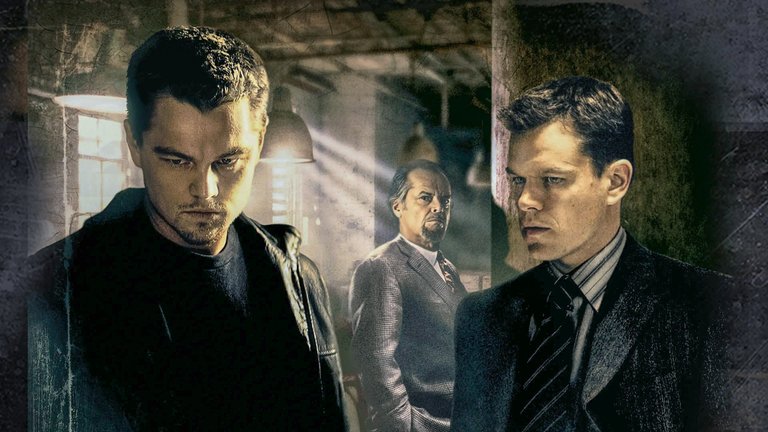Film Review: The Departed (2006)

The history of the Academy Awards is often viewed through a lens of injustice, with numerous deserving films and directors overlooked in favour of less deserving contenders. This recurring theme has led to a legacy of Oscar snubs that has become legendary in the case of Martin Scorsese. Widely regarded as one of the greatest living American filmmakers, Scorsese's career has been marked by a series of disappointments at the Oscars, ending with a long-awaited win for his 2006 film, The Departed. While this accolade was celebrated, it is often interpreted as a consolation prize, given that The Departed is not typically regarded as one of Scorsese's finest works.
The Departed is a remake of the successful and critically acclaimed 2002 Hong Kong police thriller Infernal Affairs. William Monahan's script changed the setting to Boston. The film begins with the prologue set in 1980s introducing Francis "Frank" Costello (Jack Nicholson), an Irish Mob boss who rules South Boston through intimidation and favors to local children and their parents. Decades later, one of his young proteges, Colin Sullivan (played by Matt Damon), has become a rising star within the ranks of Massachusetts State Police, taking the opportunity to secretly supply information about law enforcement activities to his old mentor. Simultaneously, William “Billy” Costigan Jr. (played by Leonardo DiCaprio), a police cadet, is recruited by Captain Oliver "Charlie" Queenan (Martin Sheen) and given the task of infiltrating Frank's organization as part of an undercover mission. Both men are unaware of each other, but when a spectacular raid against Frank fails, it becomes clear that both Frank and the police have a mole within their ranks. Sullivan and Costigan are determined to find the mole's identity, leading them to ultimately confront each other and create bloodshed and mayhem.
The film showcases Scorsese's directorial prowess, with exceptional contributions from his long-time collaborators, including cinematographer Michael Ballhaus and editor Thelma Schoonmaker, the latter of whom received an Oscar for her editing work. The film is undeniably well-crafted, with Scorsese demonstrating his ability to create a compelling and engaging narrative that draws viewers into the chaotic world of crime and deception.
However, the overall impression of The Departed may vary significantly depending on whether the viewer has seen the original Infernal Affairs. For those familiar with the Hong Kong film, comparisons often highlight the shortcomings of Scorsese's adaptation. Much of this criticism can be traced back to Monahan's script, which attempts to infuse a distinct Boston flavour into the story. This includes the larger-than-life portrayal of Frank Costello, a character clearly inspired by the real-life mobster Whitey Bulger, whose controversial relationship with the FBI, later covered in biopic The Black Mass, has been the subject of much scrutiny and scandal at the time of production and found its way to be reflected in the film.
Having the larger-than-life villain led to one of the film's notable missteps - the casting of Jack Nicholson as Frank Costello. While Nicholson is undoubtedly a talented actor, his performance often overshadows the more nuanced portrayals of DiCaprio and Damon. Nicholson's tendency to indulge in theatrics detracts from the film's overall tone. In contrast, DiCaprio and Damon deliver more restrained performances, effectively embodying their complex characters caught in a web of deception and moral ambiguity.
The romantic subplot involving psychotherapist. played by Vera Farmiga, is also overmelodramatic and not convincing, especially considering “clever” coincidence of having relationship with two nominal protagonists. The film nearly falls apart at its ending with unconvincing plot twists, especially the last scene featuring brutal and irrational violence.
Musically, The Departed features a score by Howard Shore, which, while competent, does not leave a lasting impression. In contrast, Scorsese's use of classic rock songs from artists like the Rolling Stones and Pink Floyd is far more effective, adding a layer of cultural resonance that enhances the film's atmosphere. The juxtaposition of Shore's score with these iconic tracks highlights a missed opportunity for a more cohesive musical identity.
The Departed stands as a testament to Martin Scorsese's enduring talent as a filmmaker, yet it is also a reflection of the complexities and challenges inherent in remaking an already celebrated film. Scorsese's Oscar win for this film, while deserved in the context of his illustrious career, feels more like a recognition of his past contributions to cinema rather than a validation of The Departed as one of his seminal works.
RATING: 6/10 (++)
Blog in Croatian https://draxblog.com
Blog in English https://draxreview.wordpress.com/
InLeo blog https://inleo.io/@drax.leo
Hiveonboard: https://hiveonboard.com?ref=drax
Rising Star game: https://www.risingstargame.com?referrer=drax
1Inch: https://1inch.exchange/#/r/0x83823d8CCB74F828148258BB4457642124b1328e
BTC donations: 1EWxiMiP6iiG9rger3NuUSd6HByaxQWafG
ETH donations: 0xB305F144323b99e6f8b1d66f5D7DE78B498C32A7
BCH donations: qpvxw0jax79lhmvlgcldkzpqanf03r9cjv8y6gtmk9
Posted Using InLeo Alpha
I haven’t seen this film, but given the director, I think it deserves to be added to my watchlist. Thanks for the suggestion!